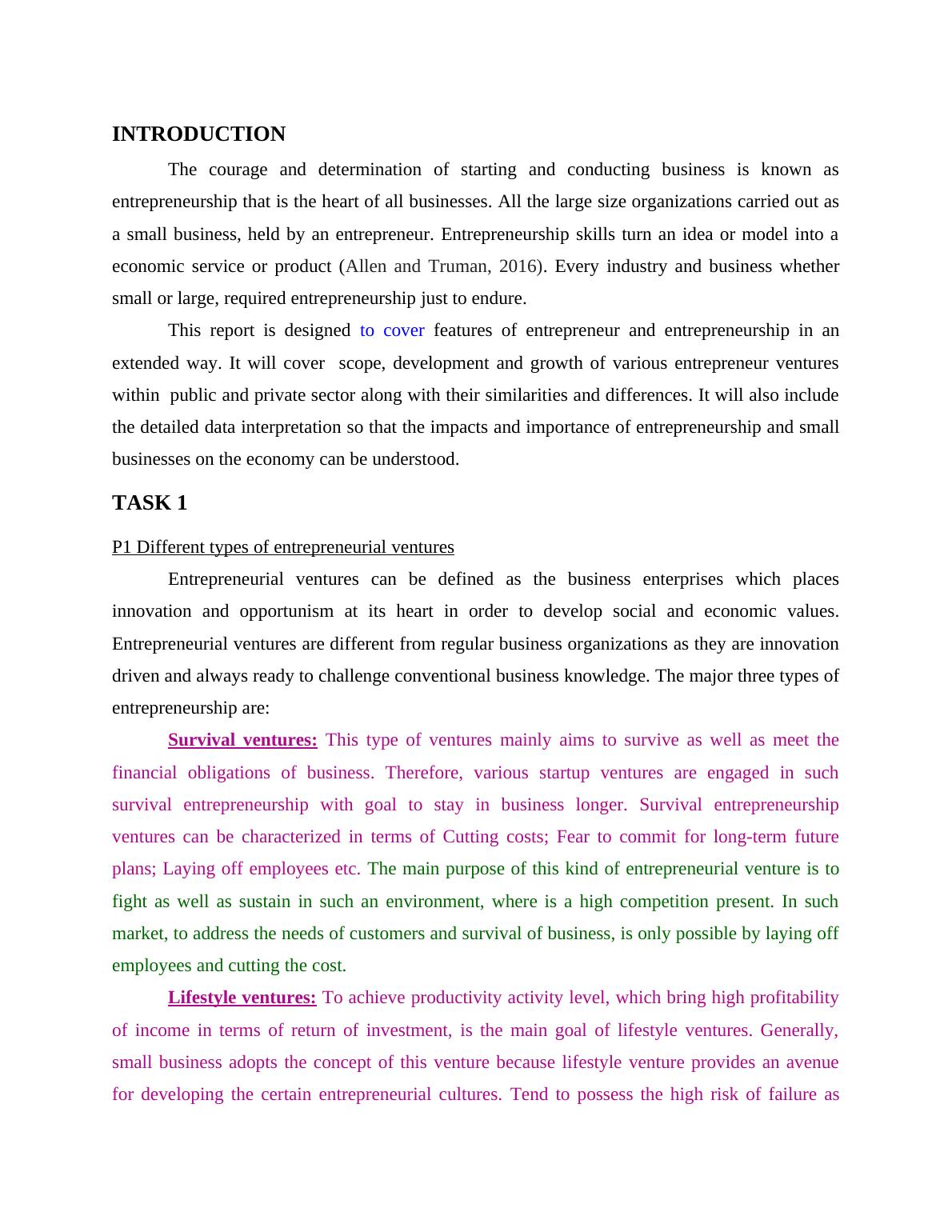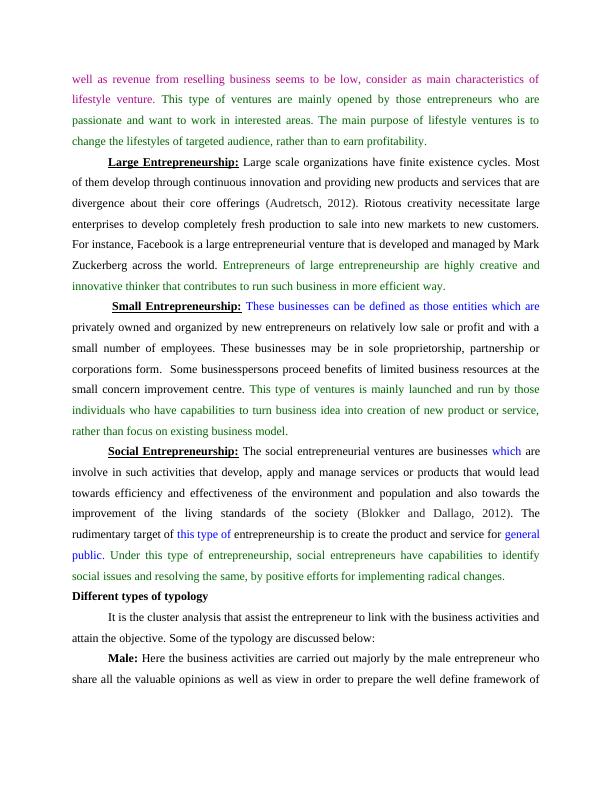Entrepreneurship and Small Business Management
Added on 2023-01-19
13 Pages3364 Words346 Views
Entrepreneurship and
Small Business
Management
Small Business
Management


INTRODUCTION
The courage and determination of starting and conducting business is known as
entrepreneurship that is the heart of all businesses. All the large size organizations carried out as
a small business, held by an entrepreneur. Entrepreneurship skills turn an idea or model into a
economic service or product (Allen and Truman, 2016). Every industry and business whether
small or large, required entrepreneurship just to endure.
This report is designed to cover features of entrepreneur and entrepreneurship in an
extended way. It will cover scope, development and growth of various entrepreneur ventures
within public and private sector along with their similarities and differences. It will also include
the detailed data interpretation so that the impacts and importance of entrepreneurship and small
businesses on the economy can be understood.
TASK 1
P1 Different types of entrepreneurial ventures
Entrepreneurial ventures can be defined as the business enterprises which places
innovation and opportunism at its heart in order to develop social and economic values.
Entrepreneurial ventures are different from regular business organizations as they are innovation
driven and always ready to challenge conventional business knowledge. The major three types of
entrepreneurship are:
Survival ventures: This type of ventures mainly aims to survive as well as meet the
financial obligations of business. Therefore, various startup ventures are engaged in such
survival entrepreneurship with goal to stay in business longer. Survival entrepreneurship
ventures can be characterized in terms of Cutting costs; Fear to commit for long-term future
plans; Laying off employees etc. The main purpose of this kind of entrepreneurial venture is to
fight as well as sustain in such an environment, where is a high competition present. In such
market, to address the needs of customers and survival of business, is only possible by laying off
employees and cutting the cost.
Lifestyle ventures: To achieve productivity activity level, which bring high profitability
of income in terms of return of investment, is the main goal of lifestyle ventures. Generally,
small business adopts the concept of this venture because lifestyle venture provides an avenue
for developing the certain entrepreneurial cultures. Tend to possess the high risk of failure as
The courage and determination of starting and conducting business is known as
entrepreneurship that is the heart of all businesses. All the large size organizations carried out as
a small business, held by an entrepreneur. Entrepreneurship skills turn an idea or model into a
economic service or product (Allen and Truman, 2016). Every industry and business whether
small or large, required entrepreneurship just to endure.
This report is designed to cover features of entrepreneur and entrepreneurship in an
extended way. It will cover scope, development and growth of various entrepreneur ventures
within public and private sector along with their similarities and differences. It will also include
the detailed data interpretation so that the impacts and importance of entrepreneurship and small
businesses on the economy can be understood.
TASK 1
P1 Different types of entrepreneurial ventures
Entrepreneurial ventures can be defined as the business enterprises which places
innovation and opportunism at its heart in order to develop social and economic values.
Entrepreneurial ventures are different from regular business organizations as they are innovation
driven and always ready to challenge conventional business knowledge. The major three types of
entrepreneurship are:
Survival ventures: This type of ventures mainly aims to survive as well as meet the
financial obligations of business. Therefore, various startup ventures are engaged in such
survival entrepreneurship with goal to stay in business longer. Survival entrepreneurship
ventures can be characterized in terms of Cutting costs; Fear to commit for long-term future
plans; Laying off employees etc. The main purpose of this kind of entrepreneurial venture is to
fight as well as sustain in such an environment, where is a high competition present. In such
market, to address the needs of customers and survival of business, is only possible by laying off
employees and cutting the cost.
Lifestyle ventures: To achieve productivity activity level, which bring high profitability
of income in terms of return of investment, is the main goal of lifestyle ventures. Generally,
small business adopts the concept of this venture because lifestyle venture provides an avenue
for developing the certain entrepreneurial cultures. Tend to possess the high risk of failure as

well as revenue from reselling business seems to be low, consider as main characteristics of
lifestyle venture. This type of ventures are mainly opened by those entrepreneurs who are
passionate and want to work in interested areas. The main purpose of lifestyle ventures is to
change the lifestyles of targeted audience, rather than to earn profitability.
Large Entrepreneurship: Large scale organizations have finite existence cycles. Most
of them develop through continuous innovation and providing new products and services that are
divergence about their core offerings (Audretsch, 2012). Riotous creativity necessitate large
enterprises to develop completely fresh production to sale into new markets to new customers.
For instance, Facebook is a large entrepreneurial venture that is developed and managed by Mark
Zuckerberg across the world. Entrepreneurs of large entrepreneurship are highly creative and
innovative thinker that contributes to run such business in more efficient way.
Small Entrepreneurship: These businesses can be defined as those entities which are
privately owned and organized by new entrepreneurs on relatively low sale or profit and with a
small number of employees. These businesses may be in sole proprietorship, partnership or
corporations form. Some businesspersons proceed benefits of limited business resources at the
small concern improvement centre. This type of ventures is mainly launched and run by those
individuals who have capabilities to turn business idea into creation of new product or service,
rather than focus on existing business model.
Social Entrepreneurship: The social entrepreneurial ventures are businesses which are
involve in such activities that develop, apply and manage services or products that would lead
towards efficiency and effectiveness of the environment and population and also towards the
improvement of the living standards of the society (Blokker and Dallago, 2012). The
rudimentary target of this type of entrepreneurship is to create the product and service for general
public. Under this type of entrepreneurship, social entrepreneurs have capabilities to identify
social issues and resolving the same, by positive efforts for implementing radical changes.
Different types of typology
It is the cluster analysis that assist the entrepreneur to link with the business activities and
attain the objective. Some of the typology are discussed below:
Male: Here the business activities are carried out majorly by the male entrepreneur who
share all the valuable opinions as well as view in order to prepare the well define framework of
lifestyle venture. This type of ventures are mainly opened by those entrepreneurs who are
passionate and want to work in interested areas. The main purpose of lifestyle ventures is to
change the lifestyles of targeted audience, rather than to earn profitability.
Large Entrepreneurship: Large scale organizations have finite existence cycles. Most
of them develop through continuous innovation and providing new products and services that are
divergence about their core offerings (Audretsch, 2012). Riotous creativity necessitate large
enterprises to develop completely fresh production to sale into new markets to new customers.
For instance, Facebook is a large entrepreneurial venture that is developed and managed by Mark
Zuckerberg across the world. Entrepreneurs of large entrepreneurship are highly creative and
innovative thinker that contributes to run such business in more efficient way.
Small Entrepreneurship: These businesses can be defined as those entities which are
privately owned and organized by new entrepreneurs on relatively low sale or profit and with a
small number of employees. These businesses may be in sole proprietorship, partnership or
corporations form. Some businesspersons proceed benefits of limited business resources at the
small concern improvement centre. This type of ventures is mainly launched and run by those
individuals who have capabilities to turn business idea into creation of new product or service,
rather than focus on existing business model.
Social Entrepreneurship: The social entrepreneurial ventures are businesses which are
involve in such activities that develop, apply and manage services or products that would lead
towards efficiency and effectiveness of the environment and population and also towards the
improvement of the living standards of the society (Blokker and Dallago, 2012). The
rudimentary target of this type of entrepreneurship is to create the product and service for general
public. Under this type of entrepreneurship, social entrepreneurs have capabilities to identify
social issues and resolving the same, by positive efforts for implementing radical changes.
Different types of typology
It is the cluster analysis that assist the entrepreneur to link with the business activities and
attain the objective. Some of the typology are discussed below:
Male: Here the business activities are carried out majorly by the male entrepreneur who
share all the valuable opinions as well as view in order to prepare the well define framework of

End of preview
Want to access all the pages? Upload your documents or become a member.
Related Documents
Entrepreneurship and Small Business Managementlg...
|13
|951
|29
Entrepreneurship and Small Business Managementlg...
|13
|3500
|88
Entrepreneurship & Small Business Management Characteristicslg...
|19
|4634
|253
Small Business and Entrepreneurship in Social Economylg...
|22
|4402
|266
Entrepreneurship and Small Business Managementlg...
|11
|883
|71
Entrepreneurship and Small Business Managementlg...
|12
|3463
|497
